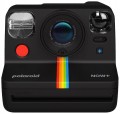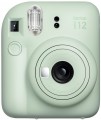Picture size
The physical size of the picture produced by the camera. At the same time, the size of photo paper always exceeds the size of the picture by 20-30%. Today there is no single standard for the size of images. Even cameras from the same manufacturer can take pictures of varying lengths and widths. The most widely used images are the following sizes: 50x75, 53x86, 62x46, 62x62, 62x99, 88x107 mm. Usually, the maximum size of an image for instant cameras does not exceed 100x150 mm).
The image size is closely related to both the image resolution and the resolution of the matrix (Mp). The larger the picture, the more detailed the image will be. Of course, the speed of obtaining photographs will also depend on the size of the image. Small photos are printed/developed at high speed. Do not forget that with the growth of the size of the picture, the cost of photographs will increase.
Power source
—
Battery. The camera is powered by a non-removable battery. Battery packs of this type usually use a high charge capacity, which is practically unattainable for ordinary removable AA batteries. The non-removable battery is recharged via the micro-USB port. Among the shortcomings, one can note only the inability to simply replace a dead battery with a pre-charged spare battery.
—
Batteries. The camera is powered by removable batteries. The battery pack is usually designed for 2-4 AA or CR2 batteries. The main advantage of solutions of this type is the ability to quickly replace dead batteries. Additionally, the user has the opportunity to select the optimal capacity of the battery pack. Among the shortcomings, one can only note the lack of the ability to charge batteries directly in the camera — this option is typical only for models with a non-removable battery.
Bluetooth
The presence of a
Bluetooth wireless communication module allows you to connect the camera to
a phone,
tablet,
laptop and use it as a printer, printing photos from other sources on the device.
Selfie mirror
A small mirror is glued to the front of the camera, usually next to the lens. Using the mirror, you can navigate in which direction and at what distance to hold the camera in order to take a good selfie.
Thread 1/4"
A 1/4" thread allows you to securely and securely fix the camera on a tripod or monopod. The need for a rigid fixation of the camera arises when shooting at a slow shutter speed. This mode is used when shooting in low light conditions, in the evening and at night.

